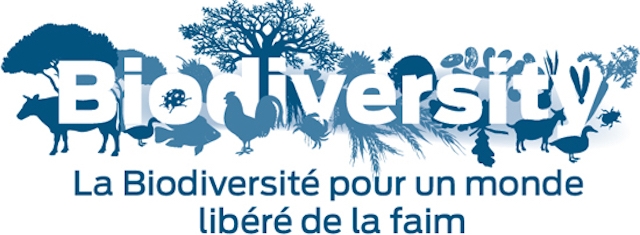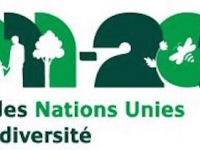News
French law for the reconquest of biodiversity nature and landscape is released
For a new harmony between nature & human

Biodiversity logo (Source: Courtesy FAO)
Further the law on the nature of 1976 and the Law on the reconquest of 1993 landscapes that Ségolène Royal has passed, a new stage is reached, it places France at the forefront with the following major advances:
CONSOLIDATED LEGAL PRINCIPLES TO BIODIVRERISTY< NATURE AND LANDSCAPE--------------------------------
- The introduction of the ecological damage compensation scheme to strengthen and consolidate the achievements of case law by introducing the polluter pays principle in the law, while guaranteeing economic players a clear and stable framework.
- Registration in the law of the principle of non-regression that the environmental protection in the texts can be as constant improvement.
- Introduction of ecological solidarity principle which recognizes the importance of the links between biodiversity conservation and human activities. This principle of solidarity applies to territories and has tools to strengthen the ecological continuity for the restoration and the creation of natural areas, and the preservation of green and blue frames.
2-CREATION OF AN INNOVATIVE OPERATOR DEDICATED TO BIODIVERSITY---------------------------------------------
The creation of an innovative operator dedicated to biodiversity to be named the French Agency for Biodiversity. The aim is to fight against the loss of biodiversity and meet the challenges of adaptation to climate change, the French agency for biodiversity is a leading operator in the service of a new development model. It will be operational from 1 January 2017.- The French Agency for biodiversity comes from the meeting of four organizations involved in biodiversity policy: the National Office for Water and aquatic environments, the Agency of marine protected areas, establishment of parks national de France and the technical Centre for natural areas.- The Agency will be an institutional benchmark for expertise, control, support and control as well as a place of partnership with local authorities, community networks, socio-professional groups, companies.
- It will exercise preservation missions, management and restoration of biodiversity, will enable the development of knowledge, balanced and sustainable water management, and the fight against biopiracy ...
- The Act also provides communities with the establishment of regional branches of Biodiversity, which aims to accelerate the deployment of closer biodiversity projects reconquest of territories.
3. CONCERTE ANSWERS TO THE ISSUES OF BIODIVERSITY------------------------------------------------------------------The Concrete answers to the issues of biodiversity include the following :
- Promoting knowledge: the data from the impact assessment will be made in the inventory of natural heritage; the law recognizes atlas landscape and setting landscape quality objectives.
- Protecting biodiversity in public and private choices: the national strategy for biodiversity is included in the environmental code; the sequence "avoiding adverse effects on biodiversity, to reduce default and, ultimately, offset residual impacts" for development projects is reinforced; individuals can now sign contracts actual environmental obligations; local authorities need to integrate urban biodiversity in territorial climate-energy plans.------------------------------------------------------------------
- Integrating the environment into the commercial urbanization, the law introduces new provisions applicable to commercial centers such as green roofs, the installation of renewable energy, the fight against the artificial soil in parking areas .
REAFFIRMINNG THAT NATURE BLEONGS TO ALL---------------------------------------------------------------------------------
- The law sets up instances of societal and expertise to involve stakeholders in discussions on biodiversity, national (National Committee of Biodiversity, National Committee for the Protection of Nature) and regional (regional committees of biodiversity ).
- The law prohibits the patenting of "products of essentially biological processes" for lifting the brake on innovation caused by the proliferation of patents on life.
- To preserve agricultural biodiversity, trade and free transfers to amateur gardeners, and free trade between farmers plant seeds in the public domain, not included in the official catalog of plant seeds, are allowed.
5-PROTECTION OF ENDANGERED SPECIES< SENSITIVE AREAS AND THE QUALITY OF OUR ENVIRONMENT
- The law strengthens the protection of endangered species tools: national plans of action to preserve and protect the endemic endangered species will be consolidated, criminal sanctions to fight against the trafficking of endangered species are strengthened.
- The protection of marine biodiversity is enhanced: the law permits the creation of the fifth largest marine reserve in the world in the waters of the French Southern and the establishment of "fishery conservation zones" to sustainable wildlife management and marine flora; it imposes anti-collision device installation on ships flying the French flag sailing the AGOA and Pelagos sanctuary to protect whales; organizes an action plan for the protection of mangroves and coral reefs of our overseas territories. - It complements the existing schemes in favor of landscapes, with the generalization of plans and landscape atlas, protection of rows of trees along the channels of communication and recognition of the profession of landscape designer. - The law goes one step further in the fight against harmful pesticides to pollinators, nature and human health with the ban on the use of pesticides containing neonicotinoids from 1 September 2018.
- Plastic Reduction for less waste at sea: the law prohibits plastic microbeads in cosmetics since 2018 and the swabs with plastic rod in 2020.
Rahma Sophia Rachdi Decree Law Human Nature Land Biodiversity President Of Cop21 French Minister Of Ecology And Sustainable Development Segolene Royal
Liability for this article lies with the author, who also holds the copyright. Editorial content from USPA may be quoted on other websites as long as the quote comprises no more than 5% of the entire text, is marked as such and the source is named (via hyperlink).







